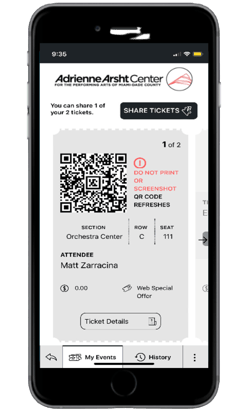Arts and Culture
Ticketing and Admissions
Article
Insights & Innovation
4e9e1f61-805e-4ce2-9666-b29e8aadc690
5 min
https://edge.sitecorecloud.io/tessituraneab9a-tessiturane5642-staging-5396/media/Images/Discover-Images/Thought-Leadership/Theatre-audience--768x465.png?h=465&iar=0&w=768
A hit should be all upside. True Tickets helps keep it that way.
You’ve got a smash hit. Dream or nightmare?

President & CEO, Tessitura
You’ve got a smash hit. Dream or nightmare?
2/7/2023
5 min
In post-pandemic performing arts, I see one trend standing out
more than any other: reliable hits are holding their own while everything else is a challenge. Audiences have returned for Hamilton, The Nutcracker, and Star Wars at the Symphony even if they haven’t hit pre-pandemic levels for lesser-known fare.
While arts organizations are rightly focused on building back the slower-selling shows, it is imperative that they make the most of their high-demand shows. Hot-selling shows should be all upside to fund and support organizational missions. However, blockbusters also come with higher risks that can include ticket fraud, price gouging on secondary markets, abundant chargebacks, and all the pain that can result.
While arts organizations are rightly focused on building back the slower-selling shows, it is imperative that they make the most of their high-demand shows.
In short, while a hit show should be every organization’s dream, it can quickly become a nightmare.

Matt Zarracina
Tessitura partner True Tickets was founded to end that nightmare. True Tickets is a secure ticket delivery technology that allows organizations to retain control of ticket sales and the identity of ticketholders from initial sale all the way to the door scan.
I recently caught up with Matt Zarracina, CEO and Co-founder, to discuss how True Tickets is changing the story around high-demand events.
A tale of two Hamiltons
Matt started our conversation by sharing a startling real-life comparison featuring two performances of Hamilton in the same month at two different venues of similar size. At Venue A, Matt found 70% of their ticket inventory available on a ticket resale site. At Venue B, which uses Tessitura and True Tickets, only 2% of their inventory was on the resale site.
As both venues are likely to sell out the performance, I said to Matt, “Who cares where the ticket gets sold as long as the venue gets the revenue?” Matt chuckled and explained why the venue should care.
“Imagine you are Venue A and 70 percent of the people showing up to see Hamilton bought their tickets from someone else. That means seventy percent of your audience won’t get any of your pre-show communications. As a result, seventy percent of your audience may be ill-informed when they arrive. Your box office will have no record of them if they come up to the window. Some of that seventy percent may have been the victims of ticket fraud. Worst of all? — From a marketing perspective, you have a sold-out show and no way to market to seventy percent of the people in the house.”
Venue A may hit their revenue targets for the night, but with so many tickets sold outside their control, they have lost agency over the customer experience, boosted the risk of pandemonium for their box office, opened up their patrons to fraud, and eliminated the ability to market to a majority of the house.
Fostering trust in ticket delivery

When you buy a ticket delivered by True Tickets, there is no ticket to resell until shortly before the show.
Matt then reminded me about Venue B, the one using Tessitura and True Tickets. Less than 2% of their tickets were available on the secondary market. That means 98% of their audience that night has received all the communications, are known to the box office, have not been victims of fraud, and are primed for a future relationship with the venue.
Terrific! But how does True Tickets keep secondary sellers from scooping up 70% of the tickets for Venue B? Matt had a simple answer: “We don’t give them anything to resell.”
When a Venue B customer purchases tickets via Tessitura and True Tickets, they receive an order confirmation but no tickets. Instead, they are sent digital “placeholders” that aren’t enabled with barcodes until shortly before the show. Technically, this doesn’t keep the reseller from scooping up tickets from Venue B, but with no actual ticket to post on their website, the resellers move on to other venues to scoop up blocks of seats that are simpler to “flip.”
With True Tickets, your audience has received all your communications, are known to the box office, are not victims of fraud and are primed for a future relationship.
Keeping up with the secondary market arms race
While the delayed barcode technology is pretty cool, I pointed out that simply delaying ticket delivery — a common technique that Tessitura supports — can achieve a similar result. Matt agreed that most ticketing providers offer this, but quickly cautioned that the resale market has continued to evolve new ways to circumvent this and other techniques. Like an arms race, as venues become more sophisticated, the secondary market evolves to match.
For instance, while delayed delivery reduces the resale window for hot shows, once the barcodes are delivered, they can be forwarded or screenshotted, with the potential for fraudulent copies being sold multiple times. How does True Tickets address this? Their barcodes are dynamic, redrawing every thirty seconds. As Matt said, “Feel free to screenshot one of our barcodes, it is going to be useless less than a minute later.”
With True Tickets, the venue can decide to even restrict the ticket from being transferred at all, making reselling practically impossible. This last technique is thanks to a new True Tickets technology called “rules-based ticket sharing,” which allows the venue to decide the rules for if a ticket can be shared and if it can be reshared.
What if you knew every person in the audience?
Matt gave me one final upside of rules-based ticket sharing. What if you want people to be able to share their tickets? This is the common use case of one person buying tickets for their group of friends. For convenience and data collection, True Tickets enables this too.
Thanks to this technology, your marketing team is well on the road to that wonderful day when they can develop relationships with every single ticket holder — not just the ticket buyers.
One of their rules allows a ticket buyer to share all their tickets except one belonging to the original ticket buyer, with all the information about the ticket recipients making its way back to Tessitura. Matt shared that organizations are already collecting tens of thousands of new-to-file names because of this feature. These audiences were always attending, but organizations never knew who they were. Now they do.
Thanks to this technology, your marketing team is well on the road to that wonderful day when they can develop relationships with every single ticket holder — not just the ticket buyers.
* * *
Know your customer: that old mantra is more important than ever. With cutting-edge technology from True Tickets, organizations can live up to the mantra in the digital age and make the most of their smash hits.
Topics
Arts & Culture
/Ticketing & Admissions

Propelling innovation
Arts & Culture / BI & Analytics / Business Strategy / Digital / Technology
Three technology advances driving digital transformation in arts and culture

Debunking four digital transformation myths
Arts & Culture / BI & Analytics / Business Strategy / Digital / Technology
Setting the record straight about common misconceptions
